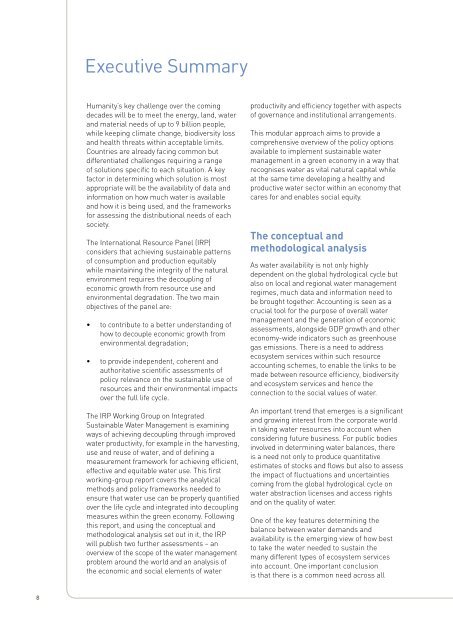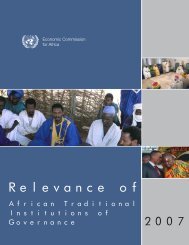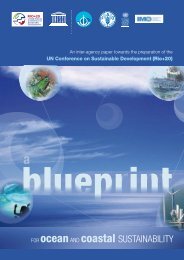MEASURING WATER USE IN A GREEN ECONOMY - UNEP
MEASURING WATER USE IN A GREEN ECONOMY - UNEP
MEASURING WATER USE IN A GREEN ECONOMY - UNEP
Create successful ePaper yourself
Turn your PDF publications into a flip-book with our unique Google optimized e-Paper software.
Executive Summary<br />
Humanity’s key challenge over the coming<br />
decades will be to meet the energy, land, water<br />
and material needs of up to 9 billion people,<br />
while keeping climate change, biodiversity loss<br />
and health threats within acceptable limits.<br />
Countries are already facing common but<br />
differentiated challenges requiring a range<br />
of solutions specific to each situation. A key<br />
factor in determining which solution is most<br />
appropriate will be the availability of data and<br />
information on how much water is available<br />
and how it is being used, and the frameworks<br />
for assessing the distributional needs of each<br />
society.<br />
The International Resource Panel (IRP)<br />
considers that achieving sustainable patterns<br />
of consumption and production equitably<br />
while maintaining the integrity of the natural<br />
environment requires the decoupling of<br />
economic growth from resource use and<br />
environmental degradation. The two main<br />
objectives of the panel are:<br />
• to contribute to a better understanding of<br />
how to decouple economic growth from<br />
environmental degradation;<br />
• to provide independent, coherent and<br />
authoritative scientific assessments of<br />
policy relevance on the sustainable use of<br />
resources and their environmental impacts<br />
over the full life cycle.<br />
The IRP Working Group on Integrated<br />
Sustainable Water Management is examining<br />
ways of achieving decoupling through improved<br />
water productivity, for example in the harvesting,<br />
use and reuse of water, and of defining a<br />
measurement framework for achieving efficient,<br />
effective and equitable water use. This first<br />
working-group report covers the analytical<br />
methods and policy frameworks needed to<br />
ensure that water use can be properly quantified<br />
over the life cycle and integrated into decoupling<br />
measures within the green economy. Following<br />
this report, and using the conceptual and<br />
methodological analysis set out in it, the IRP<br />
will publish two further assessments – an<br />
overview of the scope of the water management<br />
problem around the world and an analysis of<br />
the economic and social elements of water<br />
productivity and efficiency together with aspects<br />
of governance and institutional arrangements.<br />
This modular approach aims to provide a<br />
comprehensive overview of the policy options<br />
available to implement sustainable water<br />
management in a green economy in a way that<br />
recognises water as vital natural capital while<br />
at the same time developing a healthy and<br />
productive water sector within an economy that<br />
cares for and enables social equity.<br />
The conceptual and<br />
methodological analysis<br />
As water availability is not only highly<br />
dependent on the global hydrological cycle but<br />
also on local and regional water management<br />
regimes, much data and information need to<br />
be brought together. Accounting is seen as a<br />
crucial tool for the purpose of overall water<br />
management and the generation of economic<br />
assessments, alongside GDP growth and other<br />
economy-wide indicators such as greenhouse<br />
gas emissions. There is a need to address<br />
ecosystem services within such resource<br />
accounting schemes, to enable the links to be<br />
made between resource efficiency, biodiversity<br />
and ecosystem services and hence the<br />
connection to the social values of water.<br />
An important trend that emerges is a significant<br />
and growing interest from the corporate world<br />
in taking water resources into account when<br />
considering future business. For public bodies<br />
involved in determining water balances, there<br />
is a need not only to produce quantitative<br />
estimates of stocks and flows but also to assess<br />
the impact of fluctuations and uncertainties<br />
coming from the global hydrological cycle on<br />
water abstraction licenses and access rights<br />
and on the quality of water.<br />
One of the key features determining the<br />
balance between water demands and<br />
availability is the emerging view of how best<br />
to take the water needed to sustain the<br />
many different types of ecosystem services<br />
into account. One important conclusion<br />
is that there is a common need across all<br />
8

















